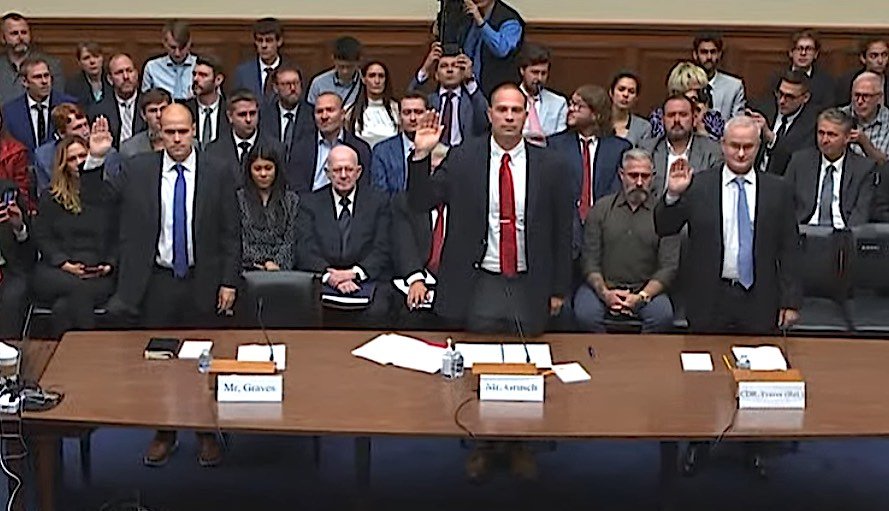

Welcome to this week’s double-sized edition of The Intelligence Brief… following the latest in a series of Congressional hearings aimed at getting to the bottom of what the United States federal government may be withholding about unidentified anomalous phenomena (UAP), our analysis in this installment will focus on several key takeaways from yesterday’s hearing. These include 1) who testified before Congress and what they said, 2) what made yesterday’s testimony different from past statements they have made, 3) the need for a formal UAP reporting system for pilots, 4) whether the U.S. has captured UAP in its possession, 5) allegations that a massive UAP was observed over a U.S. military base, and much more.
Quote of the Week
“The technology that we faced is far superior to anything that we had. And there’s nothing we can do about it. Nothing.”
– Rt. Commander David Fravor
Latest News: This week in reporting from The Debrief, we look at a study that reveals AI’s aptitude for disinformation, as well as how metals with nano-scale cracks have been observed repairing themselves. You can find links to all our latest stories at the end of this newsletter.
Podcasts: In podcasts from The Debrief, on The Micah Hanks Program, we look at some of the more extraordinary claims made by UAP whistleblower David Grusch and what history has to say about them. Also, be sure to catch The Debrief Weekly Report, which will soon be returning from a short Summer Break on Friday. You can subscribe to all of The Debrief’s podcasts, including audio editions of Rebelliously Curious, by heading over to our Podcasts Page.
Video News: This week on Rebelliously Curious, Chrissy Newton caught up with Ted Roe, the Founder of the UAP Medical Coalition and NARCAP, where they look at health concerns and other issues pilots and veterans face regarding UAP. Also, check out the latest episode of Ask Dr. Chance, where Chance has a conversation with Tim Russ from Star Trek. Be sure to watch these videos and other great content from The Debrief on our official YouTube Channel.
Now, it’s now time to take a look at what unfolded yesterday on Capitol Hill during the most recent effort by Congress to examine the UAP issue.
UAP Whistleblowers Appear Before Congress
Yesterday, the latest round of Congressional inquiries into unidentified anomalous phenomena (UAP), a subject that has become one of the most talked-about on Capitol Hill in recent years, took place during a hearing held by the Subcommittee on National Security, the Border, and Foreign Affairs.
The hearing featured testimony from two former U.S. Navy pilots, Rt. Commander Dave Fravor and Ryan Graves, as well as David Grusch, a former employee with the National Geospatial-Intelligence Agency who worked with the UAP Task Force.
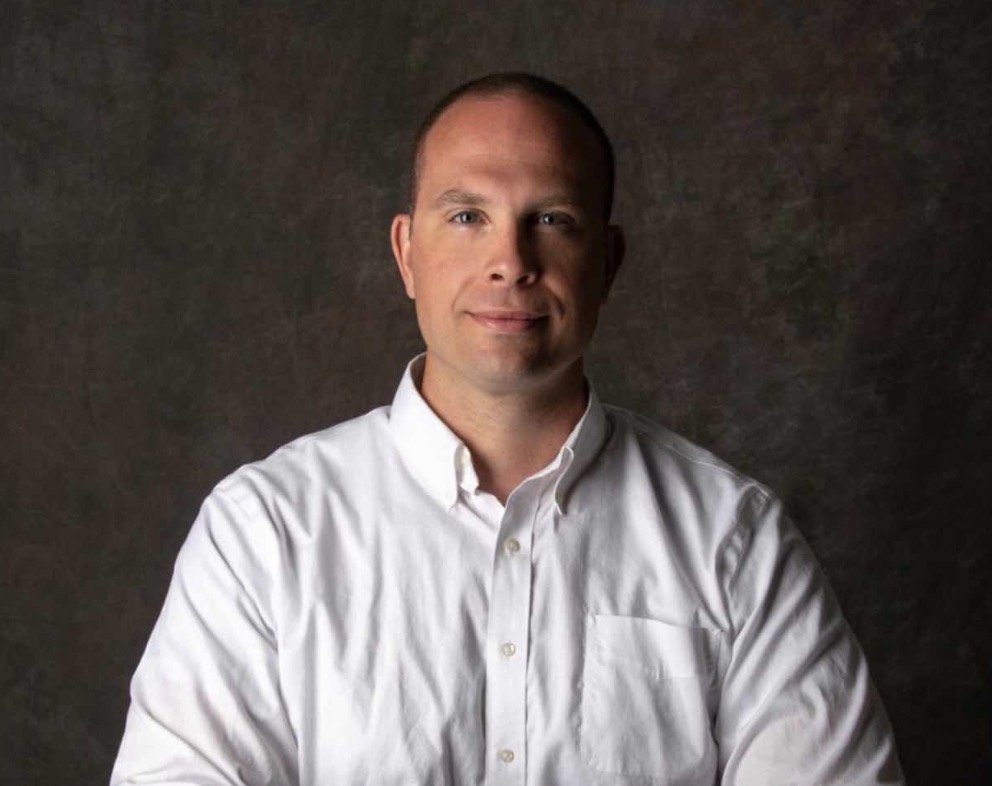

Given that all three of the witnesses who testified during yesterday’s hearing had spoken publicly (and at length) in the past, many expected that yesterday’s hearing would likely only be a rehashing of similar stories involving military encounters with unexplained phenomena, as well as David Grusch’s more recent allegations that there are secret programs that have been involved in the retrieval of craft believed to be of non-human origin.
However, in addition to several new additions to the ongoing UAP narrative, there are several reasons why yesterday’s hearings offered more than just a recap of things the public has already heard since 2017.
Speaking Under Oath
Arguably one of the most significant takeaways from yesterday’s UAP hearing had been the fact that all three witnesses were speaking under oath.
Unlike in past instances where their statements were made to journalists and others as general recollections about their experiences, all the statements they provided yesterday were sworn testimony, given to elected officials with the understanding that any false statements could result in imprisonment.
The General perjury statute under federal law in the United States (18 USC § 1621) designates that perjury is a felony punishable by a prison sentence of up to five years. While the argument persists that none of the stories presented by any of the witnesses constitute hard, physical evidence in support of a UAP reality—and that argument is a valid one—what separates these admissions by the three witnesses during yesterday’s hearing is the context, under federal law, in which they were made.
Need for a Formalized UAP Reporting System
Early in yesterday’s hearing, former U.S. Navy pilot Ryan Graves emphasized the need for having a formal reporting system through which military personnel can report UAP encounters.
“They do not have any reporting system they can send this to,” Graves said of both military and commercial aviators, many of whom have expressed to Graves that they do not know how or where to file their reports.
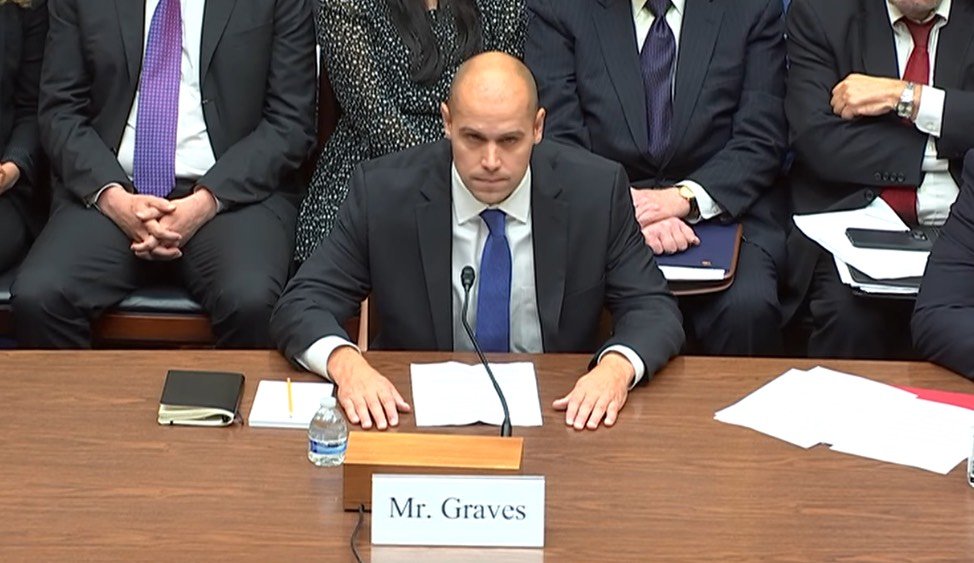

Adding to what Graves said, Commander Dave Fravor said “It’s actually a travesty that we don’t have a system to correlate this and actually investigate.”
“The commercial pilots who have reached out to me are doing so because they don’t feel there is another safe means to do so,” Graves said.
Dozens of Witnesses Told Grusch the U.S. Has UAPs in Its Possession
Given his recent arrival to the UAP debate and, of course, the controversial nature of the claims he has made, much of the attention surrounding yesterday’s hearing involved the participation of David Grusch, whose Intelligence Community Inspector General complaint was first reported by Leslie Kean and Ralph Blumenthal in an article The Debrief published on June 5, 2023.
Regarding Grusch’s recent claims about the alleged recovery of crashed vehicles of exotic origin, when asked if he thought the U.S. government was in possession of UAPs, Grusch said he believed it was a certainty.
“Absolutely, based on interviewing over 40 witnesses over four years,” Grusch said.
Grusch added that several of the individuals who provided him with this information also provided testimony that was included in his recent complaint to the Intelligence Community Inspector General, although he refrained from providing additional details on this point during yesterday’s open hearing.
A Football Field-Sized UAP Over a USAF Base?
While speaking under oath (and all that entails) during yesterday’s hearing, former Navy Pilot Ryan Graves, founder of the advocacy organization Americans for Safe Aerospace, shared a story about an observation of a massive UAP over a military installation that he had learned about.
Sometime in 2003, Graves said, “a large group of Boeing contractors were operating near one of the launch facilities at Vandenberg Air Force Base when they observed a very large, hundred-yard sided red square,” which Graves said “approached the base from the ocean and hovered at low altitude over one of the launch facilities.


Based on what Graves was told, the massive object “remained for about 45 seconds or so before darting off over the mountains.”
Graves was also told about a similar event that occurred within 24 hours where reportedly “aggressive” behavior was described by base personnel, who said they observed objects the following morning approaching them at rapid speeds, then “darting off.”
“This is information that was received through one of the witnesses that have approached me at Americans for Safe Aerospace,” Graves said, adding that “This object was estimated to be almost the size of a football field.”
“I have not seen anything personally that large,” Graves added, in reference to his own time as a U.S. Navy fighter pilot.
“Administrative Terrorism” and Harm Resulting From UAP
Among the more striking statements that came out of yesterday’s hearing, when asked if he had knowledge of individuals who had been threatened or harmed in relation to UAP investigations by the U.S. government, Grusch replied in the affirmative: a significant new claim made under oath by the whistleblower since first coming forward in June.
However, when pressed about further details, Grusch said he could not elaborate in an open hearing.
Grusch did clarify that he has received “overwhelming support” from his colleagues and former coworkers since making the decision to come forward, although he spoke during yesterday’s hearing about instances involving “active planned reprisal activity” against him and others from “certain senior leadership” at agencies he had been associated with.
“I call it administrative terrorism,” Grusch said.
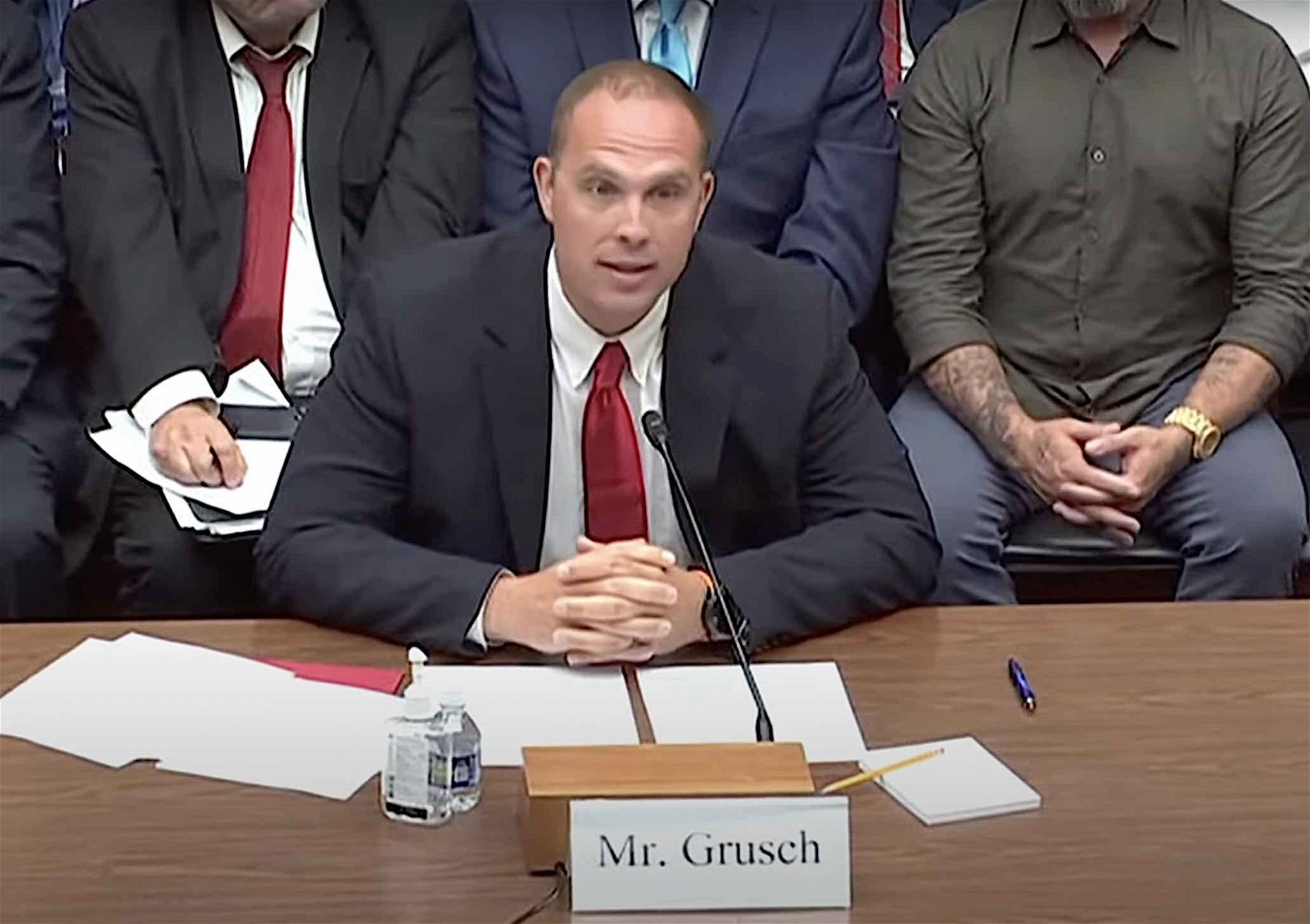

Perhaps even more telling, at one point during a series of very pointed questions asked by Representative Tim Burchett (R-TN), Grusch alluded to injuries or other repercussions some individuals may have suffered as part of an alleged coverup of UAP-related technologies.
“Do you have any personal knowledge of people who have been harmed or injured and efforts to cover up or conceal these extraterrestrial technology?” Burchett asked.
“Yes,” Grusch responded. “Personally.”
“Have you heard… have anyone been murdered that you would think that you know of or have heard of?” Burchett then asked. Although Grusch was less direct with his response, he advised Rep. Burchett that he had “directed people with that knowledge to the appropriate authorities.”
A Bipartisan Issue
Repeatedly during yesterday’s hearing, lawmakers stressed the importance of the bipartisan support the UAP subject has received.
During opening statements yesterday, Rep. Robert Garcia (D-CA) said “it’s really important that we’re here in a bipartisan way to have this conversation, which really to the heart of it is about national security and key to the subcommittee’s core purpose.”
“Democrats and Republicans in Congress can come together in a bipartisan way to cut through misinformation and to look at the facts in a serious and thoughtful manner,” Garcia added.
“I’m proud to say that, that this hearing builds upon bipartisan work by members of the House and Senate dating many years back, which has sought to increase awareness within the Department of Defense and more, and to mandate more of Congress of UAPs,” Garcia also said.
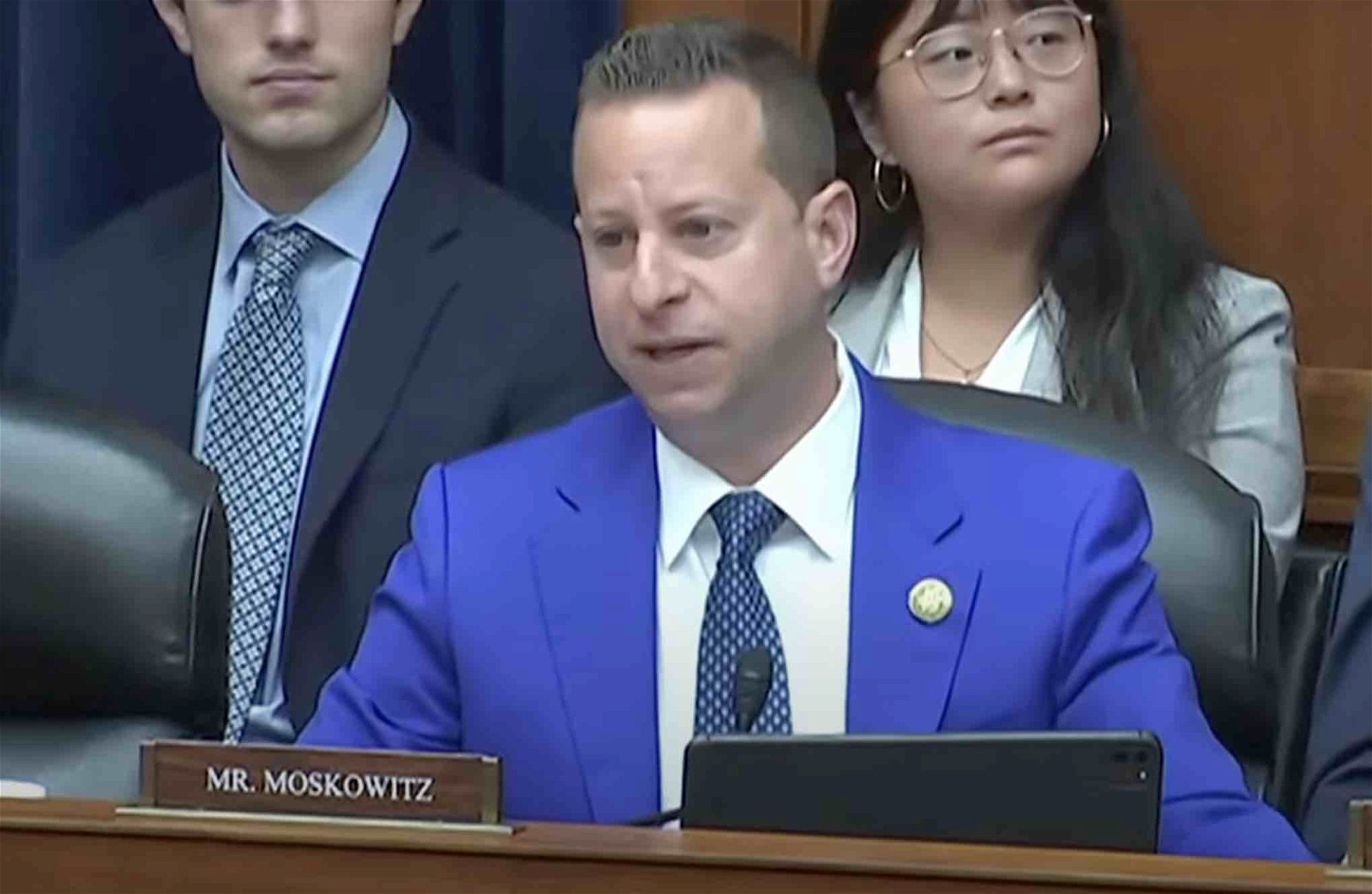

Echoing Garcia’s statements, Rep. Jared Moskowitz (D-FL) thanked the committee members and staff for “working on this on a bipartisan basis, because many Americans are deeply interested in this issue, and it shouldn’t take the potential of non-human origin to bring us together.”
“I’ve only been here for seven months, but this is by far the most bipartisan conversation and discussion that I have seen happen in the Congress,” Garcia later added during closing statements.
“And I think that a topic of this significance as it relates to our national security, as it relates to information that we’re trying to gather for the American public, does bring people together.”
That concludes this week’s installment of The Intelligence Brief. You can read past editions of The Intelligence Brief at our website, or if you found this installment online, don’t forget to subscribe and get future email editions from us here. Also, if you have a tip or other information you’d like to send along directly to me, you can email me at micah [@] thedebrief [dot] org, or Tweet at me @MicahHanks.


Here are the top stories we’re covering right now…
- NASA Discovery of Water Where Planets Form Could Have Massive Implications on the Search for Extraterrestrial Life
In a finding that could send ripples through the astronomical community, NASA says researchers have found evidence of water in a protoplanetary disc where new planets are forming.
- Journey to the Serengeti or Walk with Dinosaurs at The World’s First “Hologram Zoo”
In a futuristic innovation blending technology and wildlife, an Australian-based technology company, Axiom Holographics, has unveiled the world’s first “Hologram Zoo” in Brisbane, Australia.
- Mystery Surrounds Deaths of Three Marines Found Near Camp Lejeune
The deaths of three U.S. Marine lance corporals found near Camp Lejeune remains unclear two days after their bodies were first discovered.
- Can You Tell the Difference? Unsettling Study Reveals AI’s Aptitude For Producing Disinformation
New study explores how AI text generators impact information perception and whether people can tell AI-generated truth from disinformation.
- Forget Solar Panels. Here Come Rain Panels
In a potentially game-changing breakthrough in energy harvesting, researchers have found a way to capture, store and utilize the electrical power generated by falling raindrops, which may lead to the development of rooftop, power-generating rain panels. Previous attempts to generate power from failing rain have run into specific technical hurdles that often seemed impossible to surpass, but the researchers behind this new method say they have found a solution that may finally make such rain panels as popular, if not […]
- Archaeology in Space? New Science of Planetary Geoarchaeology Focuses on Preservation of Space Heritage
A newly proposed scientific subfield involving archaeology in space could help humans preserve the record of exploration on the Moon and Mars.
- Metals Magically Repair Themselves in Breakthrough Discovery That Could Bring About An Engineering Revolution
Research from Sandia National Labs and Texas A&M University has revealed that metals with nano-scale cracks have the seemingly magical ability to repair themselves.
- Perovskite Solar Cells Could Represent a New Era of Solar Energy, New Research Suggests
New research suggests that implementing perovskite in traditional silicon solar cells could potentially point to a new era of solar energy.
- Alien “Super-Earth” Discovery Reveals Existence of Large Planet 120 Light Years Away
The discovery of a newfound alien “super-Earth” observed orbiting a distant red dwarf star has been reported by an international team of astronomers.
- Ted Roe, Founder of NARCAP and The UAP Medical Coalition
In this interview, Chrissy Newton speaks with Ted Roe, the Founder of the UAP Medical Coalition and NARCAP (National Aviation Reporting Center on Anomalous Phenomena).
- Predicting Earthquakes Hours Ahead of Time May Finally Be Possible
French researchers who analyzed GPS data from over 900 stations covering around 90 worldwide earthquakes say they may have stumbled upon a method for predicting these catastrophic events as much as two hours before they happen.
- National Security Subcommittee Hearing on UAP: Here’s What to Expect Next Week
This week, we look at the latest news in advance of next week’s National Security Subcommittee Hearing on UAP.
- The Senate’s Fight for UAP Transparency
This week on The Micah Hanks Program, we look at what has been presented in draft language as “The UAP Disclosure Act of 2023.”
- Pentagon Official Warns of Potential Threat From Extraterrestrial “Technical Surprise” as UAP Hearing Approaches
The Pentagon’s chief UAP investigator has warned about the potetial of extraterrestrial “technical surprise” in advance of a Congressional hearing on UAP.
- Unlocking the Fountain of Youth: Groundbreaking Anti-Aging Research Holds Promise for Reversing Cellular Aging
The latest breakthroughs in anti-aging research, as scientists uncover a remarkable chemical approach to reverse cellular aging.